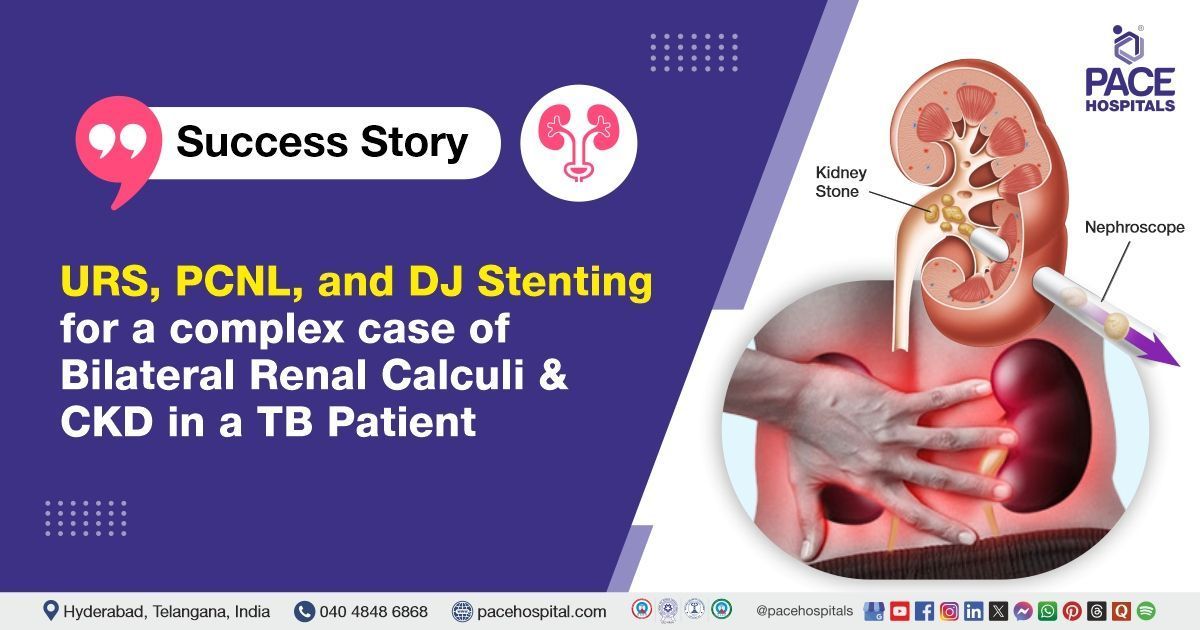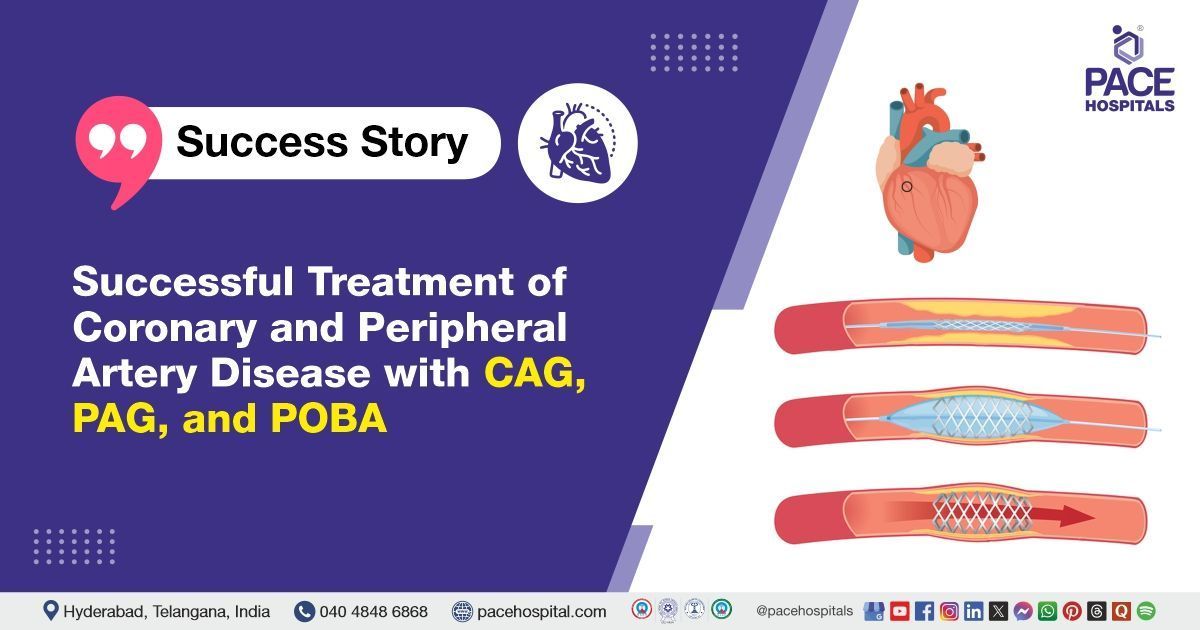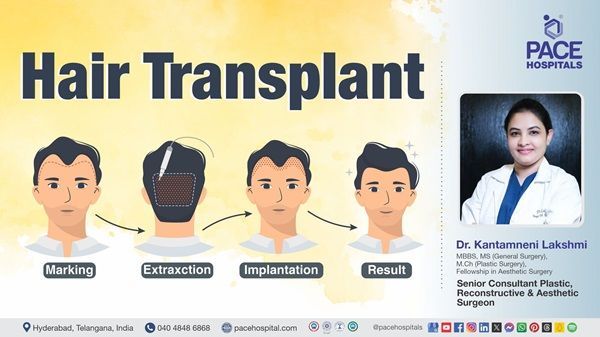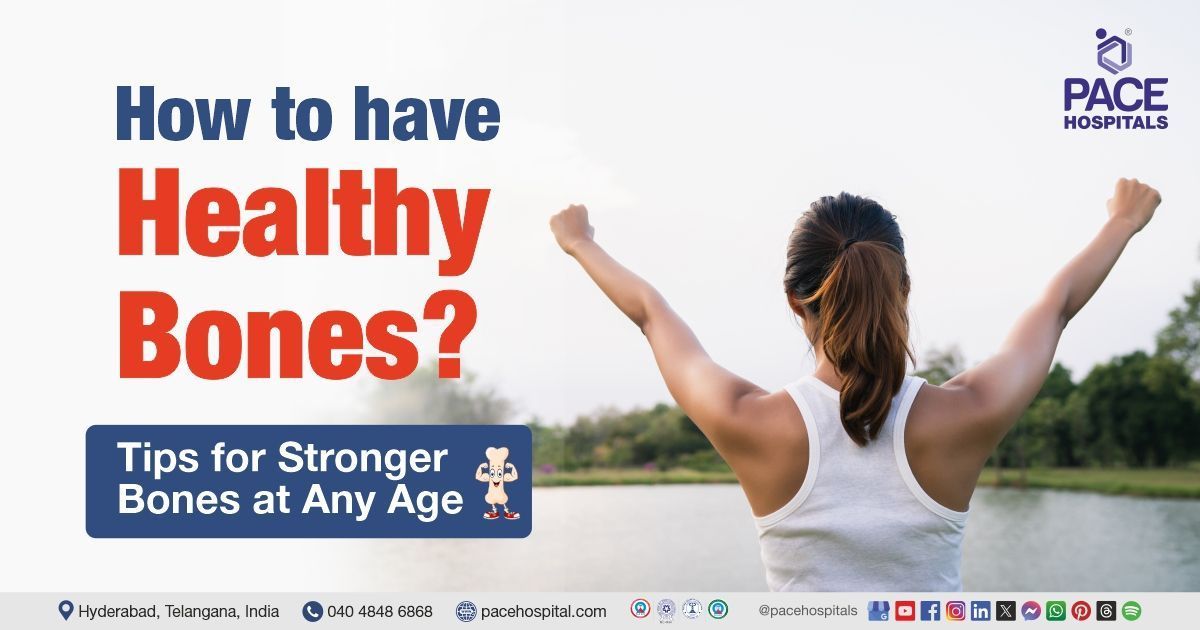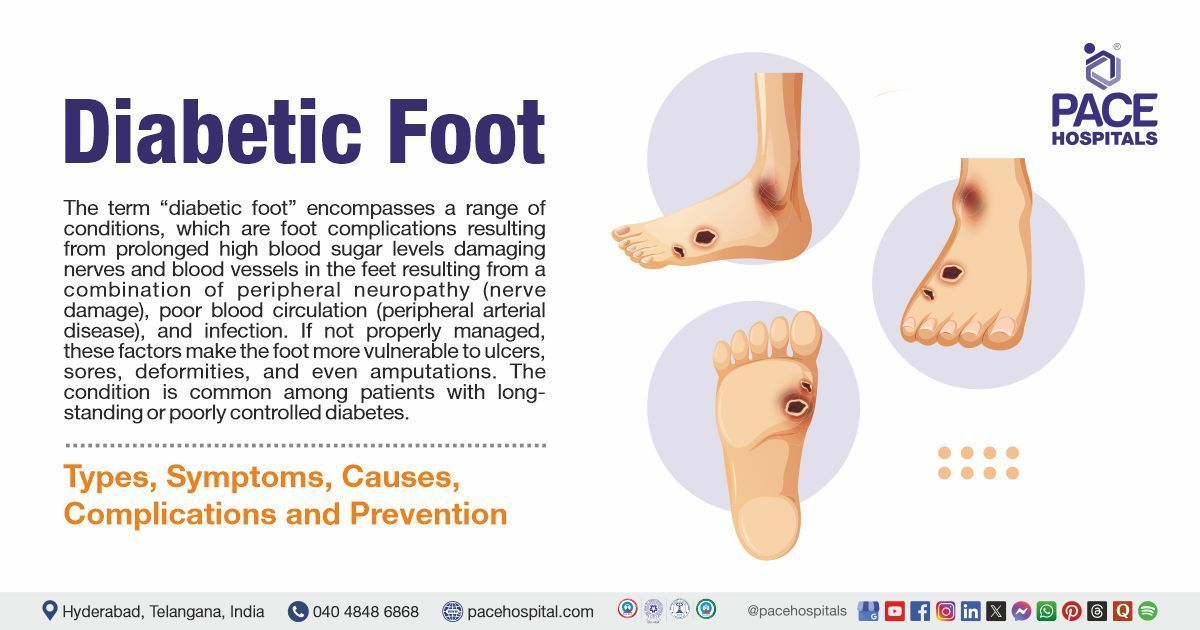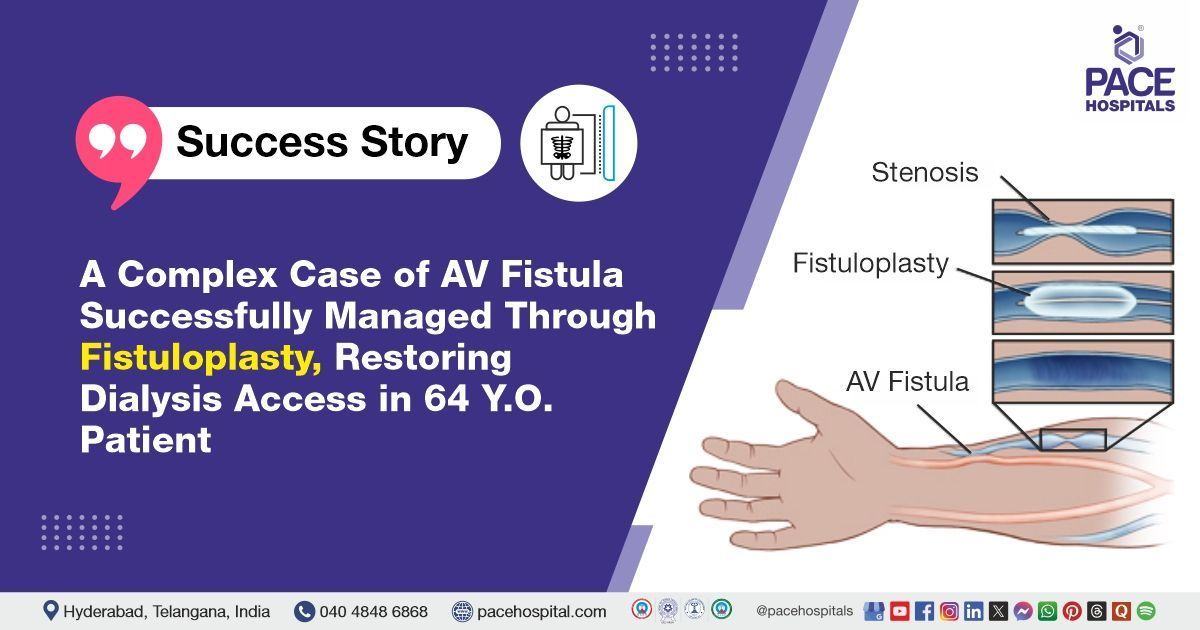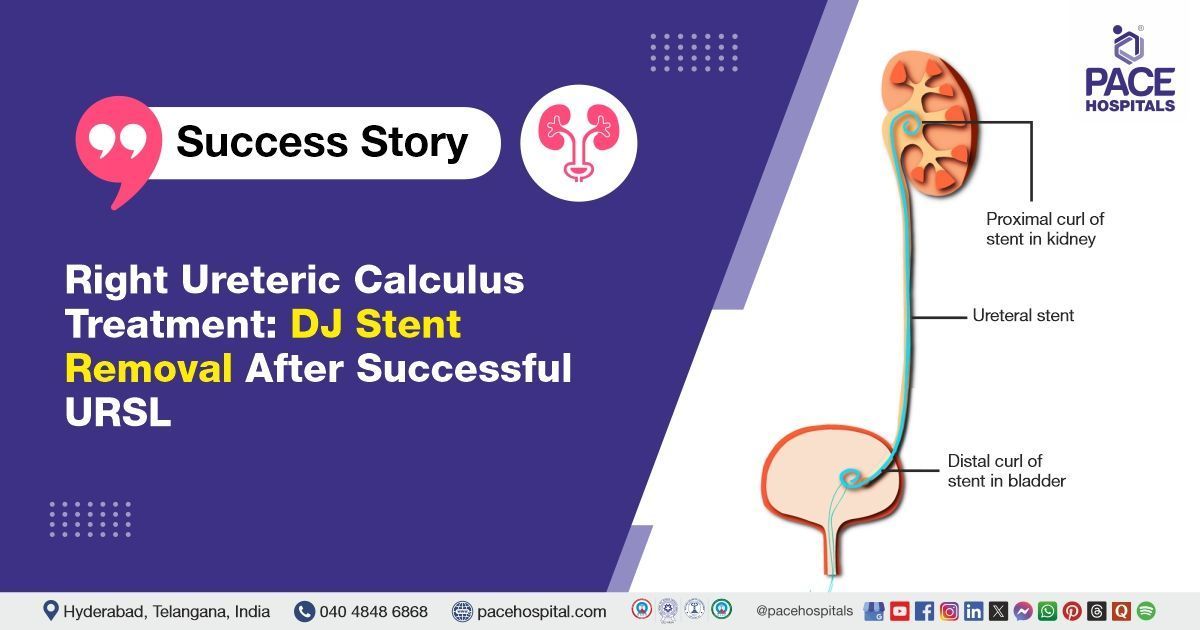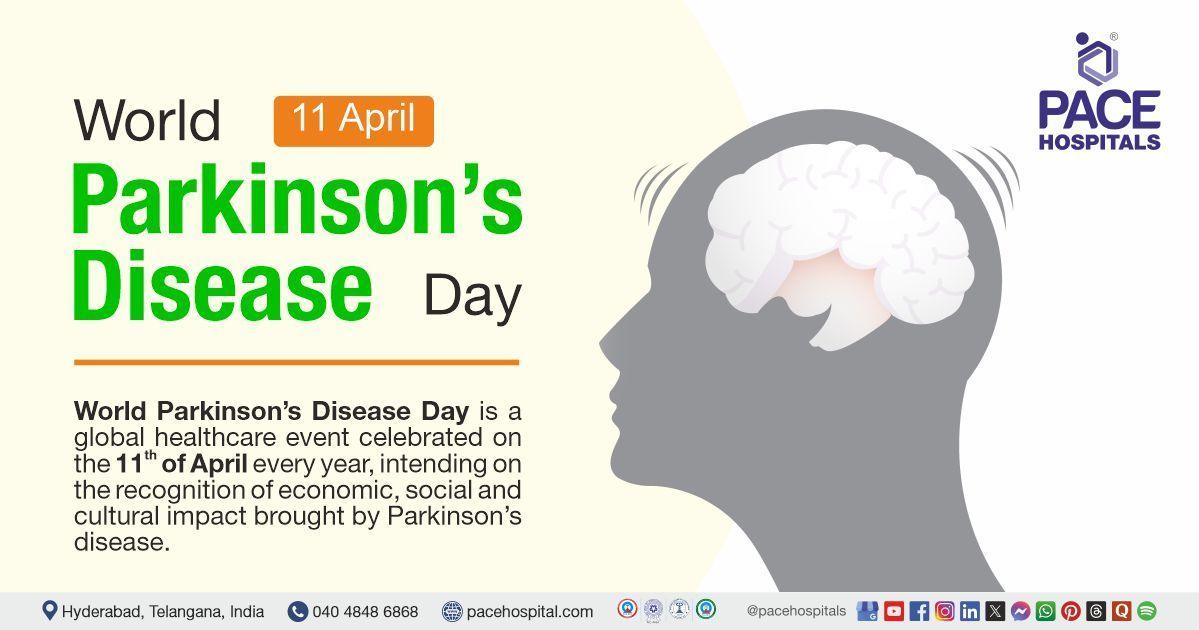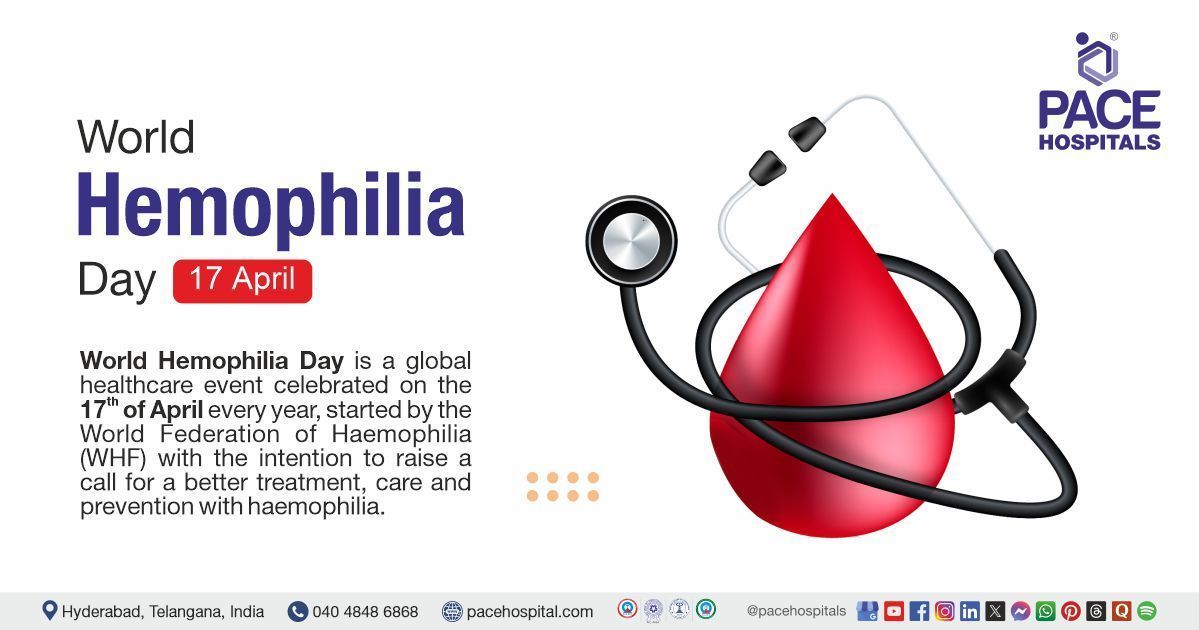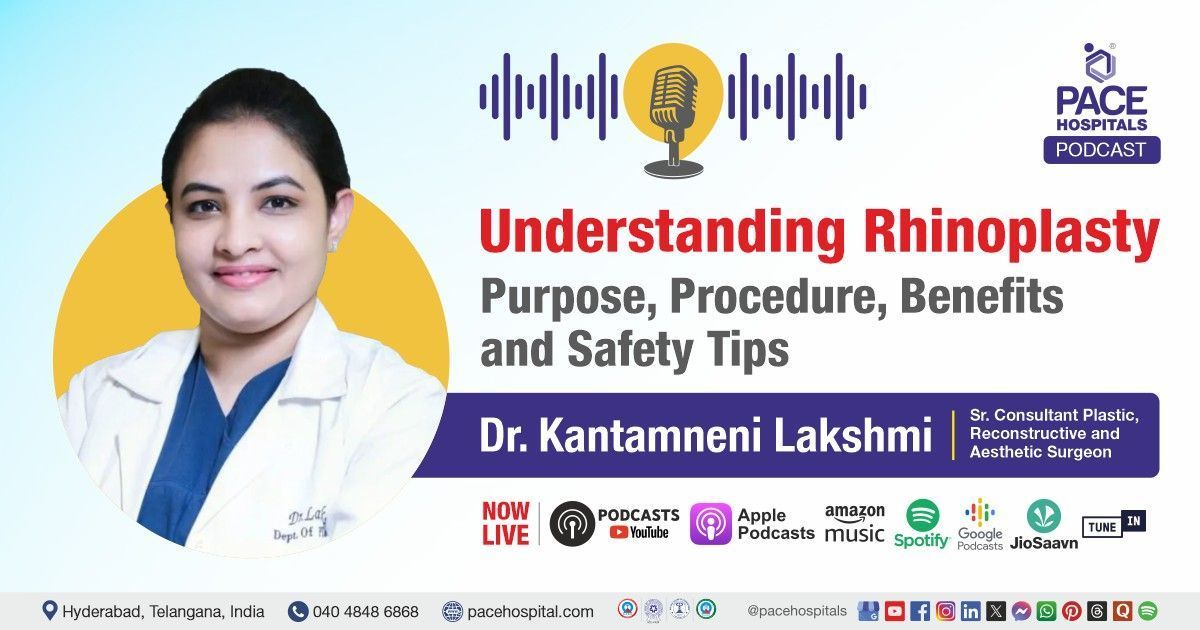URS, PCNL, and DJ Stenting for a complex case of Bilateral Renal Calculi and CKD in a TB Patient
PACE Hospitals' Urology team successfully performed a
left ureteroscopy (URS) with DJ stenting and a right ureteroscopy (URS) with percutaneous nephrolithotomy (PCNL) and DJ stenting for a 31-year-old Sudanese patient with bilateral flank pain.
A 31-year-old Sudanese male patient with a complaint of bilateral flank pain (pain in the side of the body between the upper abdomen and the back, beneath the rib cage, and above the hip) was presented to the consultant laparoscopic urologist, Dr Abhik Debnath, at PACE Hospitals, Hitech City, Hyderabad, India.
Medical History
Delving deeper, it was understood that the patient had complaints of bilateral flank pain (pain in the side of the body between the upper abdomen and the back, beneath the rib cage, and above the hip) which led to his admission to PACE Hospitals for additional care and management.
Diagnosis
Upon being admitted to PACE Hospitals and understanding the history and physical examination, the patient was subjected to a computed tomography (CT) scan and ultrasound (USG), and necessary investigations were performed. The patient was diagnosed with bilateral renal calculus (kidney stones in both kidneys), with a right obstructive pelvic calculus causing urine flow blockage and a left non-obstructive calyceal stasis calculus. Imaging showed the right kidney was functioning better than the left, which has a PUJ stricture, likely due to inflammation.
He had
chronic kidney disease (CKD) stage V, with severely reduced kidney function (Creatinine: 5 mg/dl), and pulmonary
tuberculosis (TB) with a cavitary lesion in the right lung, for which he was receiving anti-TB treatment. Additionally, his sputum test confirmed Rifampicin-sensitive TB, and treatment was started.
Treatment
After consultations with the team of consultant laparoscopic urologist - Dr. Abhik Debnath, along with consultant nephrologist, Dr. A Kishore Kumar, it was determined that left ureteroscopy (URS) with DJ stenting and a right ureteroscopy (URS) with percutaneous nephrolithotomy (PCNL) and DJ stenting were the effective methods for treating the patient.
During the treatment, pulmonologist, Dr. Pradeep Kiran Panchadi consultation was taken due to pulmonary tuberculosis (TB) with a cavitary lesion in the right lung, requiring specialized treatment and management.
Surgical Procedure
During the surgery, the doctors found a 2 cm stone in the right kidney, located in the pelvic and midpole areas, which was obstructing urine flow. They performed a procedure where they made a small puncture in the back of the kidney, created a pathway to access the stone, and used a nephroscope to remove the stone fragments. The stone was hard, so they used a pneumatic lithotriptor to break it into smaller pieces, which were then sent for analysis. A DJ stent was placed to help drain urine.
There were no complications or bleeding. On the left side, the doctors found a PUJ stricture (narrowing of the passage) and treated it with URS and DJ stenting. They also noted small kidney stones on the left side, which did not require further treatment as they were too small to cause any issues.
Postoperative Course
The patient's intraoperative and postoperative recovery was successful. He experienced no significant complications and was stable at the time of discharge.
The nephrostomy tube was removed the day after surgery, and the Foley catheter was removed on day 3. On postoperative day 1, he had mild fever (100-101°F), but an X-ray showed the stents were in place and his white blood cell count was normal. The doctors believed the fever was due to inflammation, possible TB-related issues, or surgical stress rather than an infection.
Diet Notes
Postoperative dietary advice was aimed at preventing the recurrence of renal calculi and promoting overall recovery.
The patient was instructed to maintain a fluid intake of at least 1 liter per day. He was encouraged to include citrus fruits such as lemon and juices in his diet to alkalinize the urine and reduce stone formation.
A low-purine and low-salt diet was recommended to minimize uric acid production and calcium excretion in the urine, which are common contributors to stone formation.
Discharge Medications
The discharge medications included antibiotics to prevent infections, antipyretics to manage fever, analgesics to manage pain, proton pump inhibitors (PPIs) to prevent gastric irritation, alpha-blockers to relax smooth muscles and aid urinary flow, and a urine alkalizer to maintain optimal urinary pH. These medications were aimed at facilitating recovery and preventing complications. The pulmonologist advised to continue his old medications for tuberculosis (TB).
Discharge Instructions
The patient was advised to avoid lifting heavy weights, forward bending, and prolonged travel on buses, autos, or two-wheelers. Straining during bowel movements was also discouraged to minimize pressure on the surgical site.
He was informed that the passage of stone fragments in the urine was normal, and mild symptoms like occasional blood in the urine, cloudy urine, or discomfort were expected as part of the healing process. However, he was instructed to report immediately to the emergency department in case of fever, severe abdominal pain, or vomiting, as these could indicate complications.
Review Notes
The patient was advised to return for a follow-up visit after two months with a Fourier Transform Infrared Spectroscopy (FTIR) analysis report for DJ stent removal and to check URS outcomes. This is a crucial step in the post-treatment plan to prevent stent-related complications, such as infections or encrustation. He was also advised to have regular follow ups with a pulmonologist and nephrologist.
Request an appointment
Fill in the appointment form or call us instantly to book a confirmed appointment with our super specialist at 04048486868
Appointment request - health articles
Thank you for contacting us. We will get back to you as soon as possible. Kindly save these contact details in your contacts to receive calls and messages:-
Appointment Desk: 04048486868
Whatsapp: 8977889778
Regards,
Pace Hospitals
Hitech City and Madinaguda
Hyderabad, Telangana, India.
Oops, there was an error sending your message. Please try again later. We will get back to you as soon as possible. Kindly save these contact details in your contacts to receive calls and messages:-
Appointment Desk: 04048486868
Whatsapp: 8977889778
Regards,
Pace Hospitals
Hitech City and Madinaguda
Hyderabad, Telangana, India.
Our Locations – Find the Best Hospital Near You
Metro Pillar Number C1772, Beside Avasa Hotel, Hitech City Road, Near HITEC City Metro Station, Hyderabad, Telangana, India.
Mythri Nagar, Beside South India Shopping Mall, Hafeezpet, Madeenaguda, Hyderabad, Telangana, India.
040 4848 6868
Payment in advance for treatment at PACE Hospitals, Hyderabad, Telangana, India (Pay in INR ₹)
For Bank Transfer:-
- Bank Name: HDFC
Company Name: Pace Hospitals
A/c No.50200028705218
IFSC Code: HDFC0000545 - Bank Name: STATE BANK OF INDIA
Company Name: Pace Hospitals
A/c No.62206858997
IFSC Code: SBIN0020299
Scan QR Code by Any Payment App (GPay, Paytm, Phonepe, BHIM, Bank Apps, Amazon, Airtel, Truecaller, Idea, Whatsapp etc).

CONTACT US
Call: +914048486868
WhatsApp: +918977889778
Email: info@pacehospitals.in
FOLLOW US
SUBSCRIBE
Subscribe to our newsletter and stay updated with the latest health information.
Subscribe to PACE Hospitals' Public Newsletter
Thank you for subscribing to PACE Hospitals' Newsletter. Stay updated with the latest health information.
Oops, there was an error. Please try again submitting your details.
ABOUT US
QUICK LINKS
Disclaimer
General information on healthcare issues is made available by PACE Hospitals through this website (www.pacehospital.com), as well as its other websites and branded social media pages. The text, videos, illustrations, photographs, quoted information, and other materials found on these websites (here by collectively referred to as "Content") are offered for informational purposes only and is neither exhaustive nor complete. Prior to forming a decision in regard to your health, consult your doctor or any another healthcare professional. PACE Hospitals does not have an obligation to update or modify the "Content" or to explain or resolve any inconsistencies therein.
The "Content" from the website of PACE Hospitals or from its branded social media pages might include any adult explicit "Content" which is deemed exclusively medical or health-related and not otherwise. Publishing material or making references to specific sources, such as to any particular therapies, goods, drugs, practises, doctors, nurses, other healthcare professionals, diagnoses or procedures is done purely for informational purposes and does not reflect any endorsement by PACE Hospitals – your trusted hospital near me.

